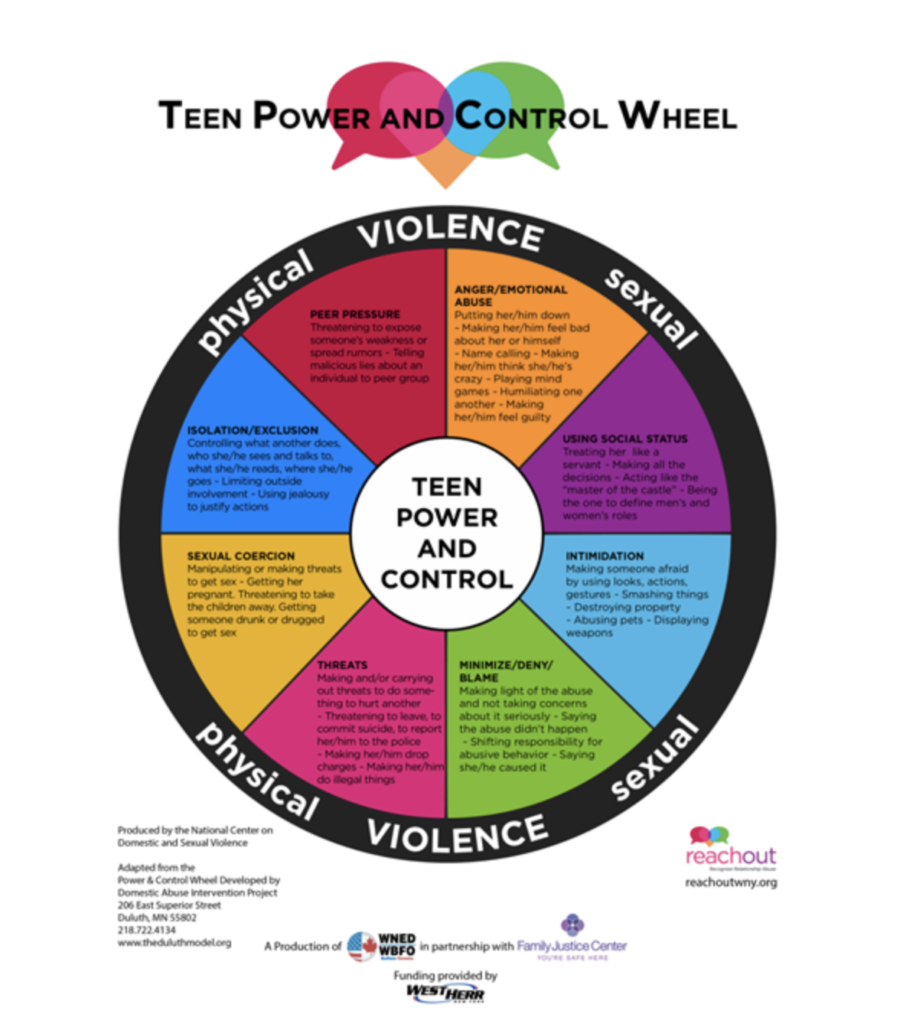Violence within intimate relationships is an uncomfortable topic for many people. Even more so is the idea that violence can occur within teen relationships. But it can and it does. Here are some statistics from the CDC (https://www.cdc.gov/violenceprevention/intimatepartnerviolence/teendatingviolence/fastfact.html)
- Nearly 1 in 11 female and approximately 1 in 15 male high school students report having experienced physical dating violence in the last year.
- About 1 in 9 female and 1 in 36 male high school students report having experienced sexual dating violence in the last year.
- 26% of women and 15% of men who were victims of contact sexual violence, physical violence, and/or stalking by an intimate partner in their lifetime first experienced these or other forms of violence by that partner before age 18
Teens are striving for independence at this phase of life, so seeking help from adults can be particularly difficult during this developmental stage. With the topic of teen dating violence itself being taboo and the challenges teens face in reaching out for help it is important for the adults in their lives to be aware of the warning signs. In order to help our teens enter into safe and healthy relationships we need to teach them about healthy relationships, understand what can go wrong in those relationships, create open lines of communication with our teens, model healthy relationships, and have resources available for teens who find themselves in difficult relationships.
Healthy relationships involve respect, honesty, open communication, compromise, boundaries and consent. Healthy relationships are not problem free, but the respect and trust the two people have allows them to resolve disagreements in safe and productive ways. In healthy relationships each person can have their own interests and other important relationships outside of the dating relationship. Each person is able to make their own choices, and though they might take their partner’s thoughts and feelings into account, there is not undue pressure to put their partner’s preferences above their own.
Relationships can become unhealthy without being violent or abusive. If you know a teen who is in a relationship that seems to have some unhealthy dynamics do not wait to see what happens. Teens are just learning about relationships. The sooner we can give them guidance about what is healthy and how to work toward making a relationship healthier, the better. Unhealthy teen relationship dynamics tend to worsen rather than improve over time without outside support.
Abusive relationships involve the use of power, coercion and/or violence (see the Teen Dating Power and Control Wheel).

In a healthy relationship a person will take accountability for doing or saying something unkind, or for overreacting. In an abusive relationship the person will deny they did anything wrong or blame the other person. Abusive relationships involve threats and intimidation. Abusive teens may try to use social status, peer pressure or popularity to manipulate their partner. They may control access to social events and friends. Threats may involve how they will portray the person or things they will share on social media. Social media can be used to monitor the person’s whereabouts or actions. It is common to try to isolate the partner from friends and family. Emotional abuse often occurs and can take many forms. Jealousy and anger are red flags to watch out for as well. There can be sexual coercion, sexual assault, or physical violence. All of these dynamics are designed to keep the abusive partner in control and the other partner dependent on their partner and the relationship. If a teen has begun to behave abusively that person would benefit from therapy or some kind of professional intervention to learn to change their behavior. Teen dating violence can lead to anxiety, depression, low self-esteem, and trauma. A teen who has endured abuse in a dating relationship may need or benefit from supportive or trauma-focused therapy as well.
Parents can start conversations early about healthy relationships. Look for opportunities to model healthy conflict resolution as well as proactive thoughtfulness and respect with your own partner. If your teens just don’t want to talk to you consider suggesting or connecting them to another trusted adult family member or family friend. Another option is to get fact sheets from the websites listed in the references here to provide to your teen. If your teen likes video games there have been recent efforts to create video games to promote healthy relationship dynamics. Check out https://jagga.me/ for a bunch of games about healthy relationships and teen dating violence.
If you see warning signs take them seriously and get your teen some support!
References and Resources:
CDC: https://www.cdc.gov/violenceprevention/intimatepartnerviolence/teendatingviolence/fastfact.html
https://www.cdc.gov/violenceprevention/pdf/ipv/TDV-factsheet_2020.pdf
Domestic Abuse Intervention Project in Duluth, Minnesota
Jag Games: https://jagga.me/
Love is Respect: https://www.loveisrespect.org/
National Center on Domestic and Sexual Violence- Teen Power and Control Wheel
Teen Dating Violence Month Webpage: https://www.teendvmonth.org/
Trauma-Focused Cognitive Behavioral Therapy (TF-CBT) certified therapists for survivors of teen dating violence: https://tfcbt.org/members/









